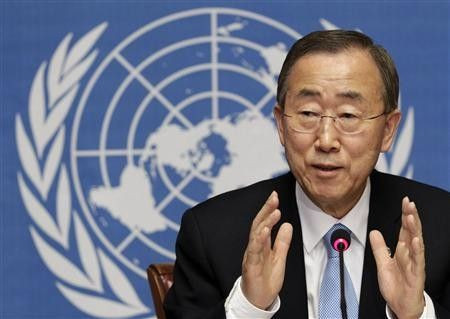UN General Assembly Backs Declaration to Fight Chronic Diseases

World leaders risk compromising their nations' own economic stability if they do not commit themselves to treating and lowering death rates from chronic diseases such as diabetes, cancer and heart and lung disease, United Nations Secretary-General Ban Ki-moon said Monday.
The U.N. General Assembly is holding a session on noncommunicable diseases this week, only the second meeting that has been held in U.N. history to focus on global health. The first gathering occurred after nations came together to address the AIDS epidemic 10 years ago.
In reaction to a study released by the World Economic Forum that said chronic diseases kill 36 million a year and are projected to cost the global economy $47 trillion in the next 20 years, the General Assembly agreed to a political declaration that endorses recommendations to reverse the rising occurrence of noncommunicable diseases.
Our collaboration is more than a public health necessity. Noncommunicable diseases are a threat to development, Ki-moon told the meeting on Monday. [Noncommunicable diseases] hit the poor and vulnerable particularly hard, and drive them deeper into poverty.
The declaration proposes ways to fight obesity, cut tobacco and alcohol consumption and expand access to essential medications in an effort to combat the unhealthy lifestyle choices that reportedly contribute to three out of every five deaths across the globe. It also aims to increase government initiatives that promote the benefits of excercise, good nutrition and screenings for such diseases.
U.N. officials have also called for cooperation from corporations that produce food, drug and tobacco products. Voice of America reports that Ki-Moon urged the marketing and advertising industries to act responsibly when promoting those products and asked that alcohol companies encourage moderation. Ban also said everyone should work together to put an end to tobacoo consumption.
The global shift in eating processed foods -- which are rich with salt, trans fats and sugar -- has let to an alarming rate of weight gain that contributes to the rise of noncommunicable diseases. Although many people assume chronic illnesses such as diabetes and heart disease primarily affect people in the developed world, noncommunicable diseases now disproportionately afflict people in poorer countries. More than 80 percent of deaths from those diseases are among people in low and middle income countries, the World Health Organization reports.
Olivier Raynaud, the senior director of health at the World Economic Forum, said the rising prevalence of these diseases usually occurs slowly rather than in an explosve outbreak. Investing in prevention now can help nations avoid the exorbitant costs that may result if the rate of noncommunicable illnesses continues to grow.
However, some people fear that major tobacco and food companies, many of which have already come under fire in Western countries, may not abide by the U.N. guidelines. While Dr. John Seffrin, the chief executive of the American Cancer Society, told Reuters that he believes the food industry and drugmakers would cooperate, he doubts the tobacco industry will give in without a fight.
Tobacco is the only renegade industry. They put profits over peoples' lives. I don't anticipate they'll do anything positive, he said.
© Copyright IBTimes 2024. All rights reserved.





















